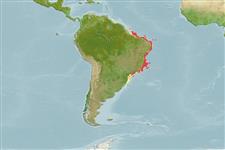>
Tetraodontiformes (Puffers and filefishes) >
Tetraodontidae (Puffers) > Canthigasterinae
Etymology: Canthigaster: Greek, kanthos = the outer or inner corner of the eye, where the lids meet, 1646 + Greek, gaster = stomach (Ref. 45335); figueiredoi: Named in honor of José Lima de Figueiredo, for his contributions to the advancement of the taxonomy of Brazilian marine fishes, as well as for his long term encouragement and support to the authors (Ref. 43205).
Environment: milieu / climate zone / depth range / distribution range
Ecologia
marinhas associadas(os) a recifes; intervalo de profundidade 1 - 70 m (Ref. 43205). Tropical; 9°N - 33°S
Western Atlantic: southern Caribbean to Santa Catarina, Brazil, including the oceanic islands of Atol das Rocas and Fernando de Noronha.
Tamanho / Peso / Idade
Maturity: Lm ? range ? - ? cm
Max length : 12.0 cm NG macho/indeterminado; (Ref. 42064)
Espinhos dorsais (total): 0; Raios dorsais (total): 9-10; Espinhos anais 0; Raios anais : 9. Differs from other Atlantic Canthigaster species by the long anterior extension of the lower horizontal dark stripe on the flank (composed of irregular horizontal and diagonal bars and originating as a solid stripe on the ventral caudal fin margin). This stripe reaches the pectoral fin base. Differs from C. jamestyleri by the presence of a dark caudal-fin margin, the absence of vertically oriented bars on the caudal fin, the possession of fewer stripes and spots on body especially on the dorsum, as well as by the absence of a small black irregular spot on the anal fin base (Ref. 43205).
Inhabits coral-rich as well as coral-poor areas, and areas with rocky bottoms (Ref. 43205). Maximum depth from Ref. 126840. Often in pairs, hovering over the reef during the day (Ref. 43205). Feeds on vegetation, sponges, crustaceans, and mollusks (Ref. 42064).
Ciclo de vida ou comportamento de acasalamento
Maturidade | Reprodução | Desova | Ovos | Fecundidade | Larvas
Moura, R.L. and R.M.C. Castro, 2002. Revision of Atlantic sharpnose pufferfishes (Tetraodontiformes: Tetraodontidae: Canthigaster), with description of three new species. Proc. Biol. Soc. Wash. 115(1):32-50. (Ref. 43205)
Status na Lista Vermelha da UICN (Ref. 130435)
Ameaça para os humanos
Harmless
Uso pelos humanos
Aquário: Espécies comerciais
Mais informação
Idade/TamanhoCrescimentoPeso-comprimentoComprimento-comprimentoFrequências de comprimentoMorfometriaMorfologiaLarvasDinâmica larvalRecrutamentoAbundânciaBRUVS
ReferênciasAquaculturaPerfil para aquaculturaEstirpesGenéticaElectrophoresesHereditariedadeDoençasProcessamentoNutrientsConversão de massa
ColaboradoresFotosStamps, Coins Misc.SonsCiguateraVelocidadeTipo de nataçãoÁrea branquialOtólitosCérebrosVisão
Ferramentas
Relatórios especiais
Baixar XML
Fontes da internet
Estimates based on models
Preferred temperature (Ref.
123201): 23.4 - 27.6, mean 27 °C (based on 177 cells).
Índice de diversidade filogenética (Ref.
82804): PD
50 = 0.5000 [Uniqueness, from 0.5 = low to 2.0 = high].
Bayesian length-weight: a=0.03631 (0.01554 - 0.08482), b=2.88 (2.69 - 3.07), in cm total length, based on LWR estimates for this Genus-body shape (Ref.
93245).
Nível Trófico (Ref.
69278): 3.1 ±0.36 se; based on food items.
Resiliência (Ref.
120179): Elevada, tempo mínimo de duplicação da população menor que 15 meses (Preliminary K or Fecundity.).
Fishing Vulnerability (Ref.
59153): Low vulnerability (10 of 100).
Nutrients (Ref.
124155): Calcium = 107 [49, 256] mg/100g; Iron = 1 [0, 2] mg/100g; Protein = 18.1 [15.9, 20.3] %; Omega3 = 0.127 [0.061, 0.255] g/100g; Selenium = 35.6 [16.9, 79.5] μg/100g; VitaminA = 49.6 [13.6, 189.5] μg/100g; Zinc = 1.69 [1.08, 2.55] mg/100g (wet weight);
